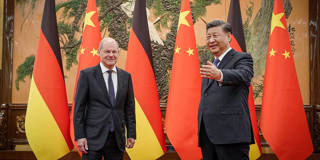Germany's post-war policy of engaging economically with rivals was fundamentally a bet on globalization, and globalization is always changing. Though it will undoubtedly continue to develop in new and unexpected directions, that is no reason to reject the idea that interdependence supports peace and prosperity.
BERLIN – Since Russia’s invasion of Ukraine, German politicians have been on an apology tour for their country’s past reliance on Russian hydrocarbons and advocacy of EU-Russian energy integration. German Chancellor Olaf Scholz has responded to Russian aggression by declaring a Zeitenwende (turning point) and finally shutting down the Nord Stream 2 pipeline. Yet many still see that project as a blot on Germany’s honor and its political savvy.
A year and a half later, German leaders are still grappling with past policy mistakes and struggling to draw clear lessons from them. Given that Germany’s export-driven economy remains deeply dependent on the Chinese market, its approach to China is highly conflicted and ambivalent.
Hence, in late June, while US President Joe Biden refused to apologize for describing Chinese President Xi Jinping as a “dictator,” Chinese Prime Minister Li Qiang paid a cordial visit to Germany, where he and Scholz celebrated the role that Sino-German business relations might play in balancing the increasingly tense Sino-American rivalry. But then in September, German Foreign Minister Annalena Baerbock repeated Biden’s “dictator” jibe just as EU Trade Commissioner Valdis Dombrovskis clarified that “the EU has no intention of decoupling from China.”

BERLIN – Since Russia’s invasion of Ukraine, German politicians have been on an apology tour for their country’s past reliance on Russian hydrocarbons and advocacy of EU-Russian energy integration. German Chancellor Olaf Scholz has responded to Russian aggression by declaring a Zeitenwende (turning point) and finally shutting down the Nord Stream 2 pipeline. Yet many still see that project as a blot on Germany’s honor and its political savvy.
A year and a half later, German leaders are still grappling with past policy mistakes and struggling to draw clear lessons from them. Given that Germany’s export-driven economy remains deeply dependent on the Chinese market, its approach to China is highly conflicted and ambivalent.
Hence, in late June, while US President Joe Biden refused to apologize for describing Chinese President Xi Jinping as a “dictator,” Chinese Prime Minister Li Qiang paid a cordial visit to Germany, where he and Scholz celebrated the role that Sino-German business relations might play in balancing the increasingly tense Sino-American rivalry. But then in September, German Foreign Minister Annalena Baerbock repeated Biden’s “dictator” jibe just as EU Trade Commissioner Valdis Dombrovskis clarified that “the EU has no intention of decoupling from China.”